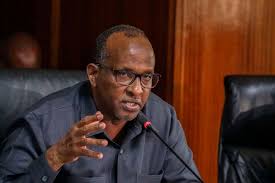Defence Cabinet Secretary Aden Duale has called on the government to compensate families of terror victims from North Eastern Kenya who lost their lives during previous administrations, particularly under retired President Uhuru Kenyatta.
Speaking in Balambala, Garissa County, on Saturday, August 16, Duale said that the state should equally compensate victims of historical injustices in Wagalla and Malka Mari. According to him, recognizing the pain endured by North Eastern communities would ensure fairness in how the government handles compensation across the country.
“So many people died during the previous administration, and let me make it clear that if there is compensation, the people who died in the North Eastern region during the previous administration must be compensated,” Duale stated.
The CS also criticized what he termed as the projection of some regions as “superior to others,” a jab he directed at certain political leaders, including former Deputy President Rigathi Gachagua. He argued that such attitudes undermine President William Ruto’s efforts to unite the nation and empower marginalized communities.
“There is no superior region and there is no superior religion here in Kenya. President Ruto is becoming a victim of political shenanigans because he wants to unite the country and has brought more empowerment than what other presidents have done,” he added.
Duale further accused past regimes of sidelining North Eastern Kenya, while reaffirming that the region would remain solidly behind Ruto. “President Ruto has slept in Mandera, yet some people still undermine us because they claim there are criminals here. I want to tell the opposition that the days of entitlement are over,” he remarked.
However, Duale’s comments drew sharp criticism from former Trade Cabinet Secretary and Ruto’s senior economic advisor, Moses Kuria. He warned against profiling the Mt Kenya region, cautioning that such rhetoric risks reviving divisive ethnic politics.
“If you have a problem with any individual from the Mt Kenya community, do not take it out against an entire people,” Kuria said, urging leaders to avoid wholesale condemnation. He added that collective punishment of communities could trigger unintended and dangerous political consequences.
The exchange highlights growing tensions within the political class over historical injustices, regional equity, and the delicate balance of national unity.

